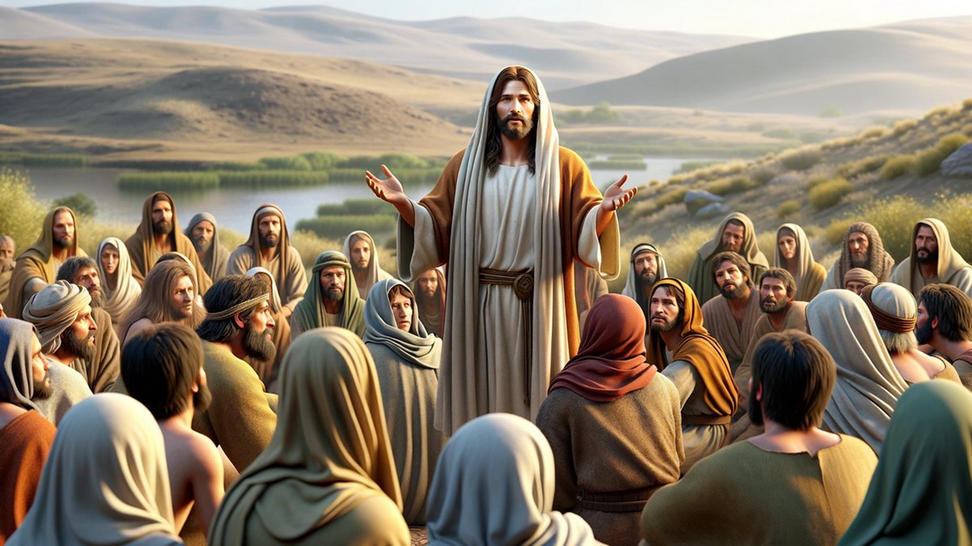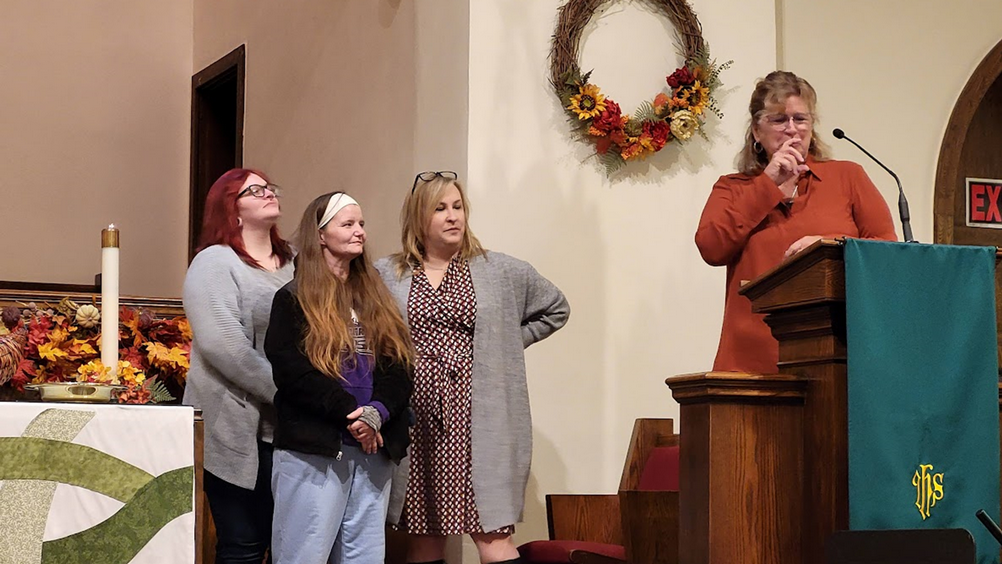Jesus' New Beginning
OT Lesson: Genesis 12:1-9 (CEB)
The Lord said to Abram, “Leave your land, your family, and your father’s household for the land that I will show you. I will make of you a great nation and will bless you. I will make your name respected, and you will be a blessing.
I will bless those who bless you,
those who curse you I will curse;
all the families of the earth
will be blessed because of you.”
Abram left just as the Lord told him, and Lot went with him. Now Abram was 75 years old when he left Haran. Abram took his wife Sarai, his nephew Lot, all of their possessions, and those who became members of their household in Haran; and they set out for the land of Canaan. When they arrived in Canaan, Abram travelled through the land as far as the sacred place at Shechem, at the oak of Moreh. The Canaanites lived in the land at that time. The Lord appeared to Abram and said, “I give this land to your descendants,” so Abram built an altar there to the Lord who appeared to him. From there he travelled toward the mountains east of Bethel, and pitched his tent with Bethel on the west and Ai on the east. There he built an altar to the Lord and worshipped in the Lord’s name. Then Abram set out toward the arid southern plain, making and breaking camp as he went.
NT Lesson: Matthew 4:12-17 (NRSV)
Now when Jesus heard that John had been arrested, he withdrew to Galilee. He left Nazareth and made his home in Capernaum by the sea, in the territory of Zebulun and Naphtali, so that what had been spoken through the prophet Isaiah might be fulfilled:
“Land of Zebulun, land of Naphtali,
on the road by the sea, across the Jordan, Galilee of the Gentiles—
the people who sat in darkness
have seen a great light,
and for those who sat in the region and shadow of death
light has dawned.”
From that time Jesus began to proclaim, “Repent, for the kingdom of heaven has come near.”
Sermon
Introduction
Good morning. As we approach May, we are greeted by abundant rains, living up to the saying, “April showers bring May flowers.” This makes it an ideal time to take beautiful flower photographs for the photo contest. Spring is a season laden with good things, not least of which is the return of our members and friends from their seasonal stay in Florida—welcome back!
Spring heralds a time of new beginnings in nature. We see geese, ducks, and many other birds laying eggs, with the promise that soon, all the fledglings will break free from their egg shells. Similarly, bunnies, deer, and other animals give birth to their young. Trees sprout new leaves, seeds push through the soil, the grass grows greener, and the weeds taller. Insects and bugs are burgeoning too. Speaking of which, I recently read that this year, two different cicada broods—one emerging every thirteen years and the other every seventeen—will surface simultaneously. This phenomenon, occurring for the first time in 221 years since 1803 during Thomas Jefferson’s presidency, is a rare natural spectacle. I recall the Brood X emergence in 2021 when cicadas blanketed nearly all the trees, making it impossible to have a normal conversation with windows open. I experienced this in Southern Indiana near Bloomington. Did you encounter the same here in Lebanon in 2021? While I am not sure where these cicadas will appear, if they emerge locally, we might indeed need earplugs. And if an area has overlapping both broods, I am quite certain that it could significantly affect or damage the hearing of the local populace.
End Is Beginning
Last Sunday, we celebrated PPM Sunday, and it was a joy to worship with the little children at our Presbyterian Preschool Ministry and with their parents. Some of the children who participated last Sunday will soon graduate from PPM next month. Likewise, all the fifth graders in our town are preparing to graduate from elementary schools, and similar transitions will occur for eighth graders and high school seniors. Graduation inherently signifies completion or an end by definition. Once seniors graduate, they no longer attend high school because they have completed that chapter of their education. However, an end is often synonymous with a new beginning. After completing PPM, children start kindergarten. From there, they progress to elementary school, then to middle school, and high school, each phase marking an end and at the same time a beginning. Eventually, they embark on new journeys, either entering college or joining the workforce as valuable members of society. Thus, the term ‘graduation’ is also known as ‘commencement,’ which, by definition, means a new start. Graduation’s word definition is an end. Commencement’s word definition is a beginning. But both graduation and commencement refer one same ceremony. So one end is just another beginning. In another or personal reflection, when you get married, your fun single life comes to an end, but a new, shared life begins. Every ending is essentially the start of something new.
Not long ago, we observed the end of Lent with the celebration of Easter. During Lent, we focused on the solemn journey of Jesus Christ towards His suffering and crucifixion at Calvary. Yet, this accounts for only half of the Lenten story. The duration of Lent—forty days—commemorates the time Jesus spent fasting in the wilderness before being tested by Satan three times. Let us consider His timeline briefly: Jesus, born and raised, began working as a construction worker after becoming an adult at the age of twelve. While traditional English translations often refer to Him as a carpenter, the original Greek texts use a term that can mean ‘mason.’ In the arid, tree-scarce Judean wilderness, stone was far more common than wood. Whether as a carpenter or a mason, Jesus spent most of His adulthood in construction. At thirty, He was baptised by John the Baptist, marking the end of His life as a labourer and the beginning of His divine ministry. So this baptism was both graduation and the commencement of Jesus. This transition was followed by forty days of fasting, a period akin to a summer break before embarking on a new phase of life, like students have summer vacation between the end of one school year and the beginning of the next school year. This is why I choose to discuss the new beginning of Jesus’ ministry now, as according to the liturgical calendar, Lent has just concluded and His ministry has commenced. Moving forward, we will delve into the Gospel of Matthew, starting from chapter 4, exploring it verse by verse.
Location, Location, Location
I have often heard it said that when you open a business, the three most important things are “location, location, location.” While location may not be the only crucial factor, it is undeniably among the top considerations. Take, for instance, Harrison Ford, the iconic actor known for roles like Indiana Jones and Han Solo in Star Wars. Originally from Chicago, Illinois, he moved to Hollywood without any concrete plans or promises, spending many years making a living as a carpenter. Jim Carrey, the famous comedian from films like Dumb & Dumber or the Mask, hailed from Toronto, Canada, but he too moved to Hollywood to pursue his acting career without any concrete plans or promises. Jennifer Lawrence from the Hunger Games left Kentucky and Michael J. Fox from the Back to the Future franchise left Canada for the same reasons. You can name more. How many actors or actor candidates are moving to Hollywood without any concrete plans or promises? They are all heading to Hollywood, the hub for aspiring actors. My question is this: Lebanon is a lovely place but why don’t they come and stay here in Lebanon to become successful actors? Because location matters immensely. While Lebanon is a lovely place without doubt, it is not the right place for movie industry. Poor location will lead the business to failure. When you go to the so-called ghetto-ish neighbourhoods, you can see so many closed shops and stores because that is not the right location for successful business. Even grocery stores are mostly shut down, causing that area a food desert in this nation where the food is overflowing. So location is important without doubt. When you want to be an actor, you go to Hollywood. When you want to be a country singer, you go to Nashville, TN. When you want to start a computer business, you go to Silicon Valley. Location, location, location.
Now in today’s Old Testament lesson, consider God’s call to Abraham for a new beginning, signalling a move to a better location. Typically, immigration involves moving to a location perceived as better than the current one. For example, Syrians move to France because they think France is better to live in than Syria. Many Africans go to Europe because they think Europe in general is better than Africa. And likewise people from across the globe come to America, seeking a better life. Abraham, residing in the wealthy and advanced civilisation of Chaldean Ur, was instructed to move to Canaan—a place far less prosperous. It is akin to telling someone from Los Angeles to relocate to Uganda for a better life. On the surface in the human eyes, it does not make sense. God, aware of this, chose not to reveal the destination initially, deliberately ignoring the “location, location, location” principle.
In today’s New Testament lesson, we see Jesus initiating a new religious movement from Capernaum in Galilee. Many would assume that, being the source of all wisdom and knowledge, Jesus chose the prime and the best location for such an endeavour, perhaps something akin to the Nashville of country music, the Hollywood of the film industry, or Silicon Valley for tech. However, the ideal location for starting a religious movement would typically be a place like where there is a keen interest in religion and ample wealth to support it. And that location is Jerusalem, which Jesus did not choose. Then you may think that Capernaum must be the second best location. This town’s name in Hebrew as כְּפַר נַחוּם (Kafar Nahum), which means “the village of Nahum,” and described by Matthew as “Galilee of the Gentiles”—a label that could be seen as insulting, humiliating and degrading when referring to a Jewish town. It is like calling a Jewish town a Nazi village. Despite this, the people of Capernaum were largely indifferent to such labels because of the two main reasons. First of all, it was somewhat true. Capernaum was very gentile-ish. It was near the region of Decapolis, which means ten cities in Greek, where the gentiles were the major residents. So Capernaum was hugely influenced by the gentile, precisely Greco-Roman culture, language, philosophy, and religion. Second of all, the people of Capernaum were not ashamed of such labels because of the significant economic benefits brought by their proximity to the Decapolis. While Capernaum was highly influenced by Gentile culture, it was also near the headquarters of the Zealots, extreme Jewish nationalists, whose goal was to achieve the independence from Rome by violence and blood. It is like KKK and Black Lives Matter are both headquartered in one town. You can imagine the daily tension in the town. Capernaum was where the two extremists were colliding, hating each other to the death. Thus, Capernaum, with its mix of extreme influences, was arguably one of the least ideal or the worst locations to start a new religious movement. This juxtaposition of extremities, mirroring the intense polarisation seen in today’s American political landscape, where there is no real conversation but only cursing each other. But the thing is that Jesus chose this worst location of Capernaum for His ministry.
Location for True Ministry
Indeed, Jesus chose Capernaum not for its prominence or ideal conditions, but because it was a place in need—a place enveloped in spiritual darkness. Jesus chose Capernaum not because people were living in the light, but because they were sitting in the darkness. Similarly, Jesus chose us not because we were righteous, but because we were sinners in need of grace. He came to save us not because we were well, but because we were spiritually sick, needing a physician of souls. Jesus is with us not because we are driving Porsche on the sun-shining highway but because we are walking through the valley of the shadow of death.
In choosing our ministry locations, we must emulate Jesus. Let us reflect on our ministries. Just yesterday, a group of dedicated, wonderful, lovely, and beautiful Presbyterians came together to assemble baby packs. These packs, filled with hygienic items often taken for granted in America, are vital for the survival of newborns and their mothers in Malawi. Why do we engage in this ministry? Is it because the mothers and babies in Malawi enjoy the superb healthcare? No, on the contrary and tragically, the lack of proper care and unsanitary conditions contribute to high mortality rates among infants and mothers. Malawi is indeed our Capernaum, a place deeply in need of our help.
Consider our support for Live for Life Indiana, a shelter for women. We contribute funds and other necessities, but why? Is it because the women there enjoy a leisurely, comfortable life like staycation in the shelter? Far from it. Many of these women, including some with children, have no other place and refuge from abuse and violence at the hands of their own partners or family members. They are fighting to regain their footing in life, making this shelter our another Capernaum, calling for our compassion and support.
And what about the Caring Centre? We regularly donate money, non-perishable food, and other items for sale in their thrift store. Do we do this because all the people in Lebanon are well-off, dining on lobster and steak every single day? Certainly not. The harsh reality is that many in our community struggle for basic sustenance, and their children suffer from under-nutrition. Children in North Korea or other places are hungry. Though the fact makes me feel terrible, it is understandable. But in a country as prosperous as the United States, it is unacceptable that anyone especially children should go hungry. Yet, this is the situation facing some right here in Lebanon. The Caring Centre thus stands as yet our another Capernaum—a place where our efforts can make a real difference in battling hunger and deprivation. By the way, what do we call ourselves here in Lebanon? In Chicago, residents are known as Chicagoans; in Winnipeg, they are Winnipeggers; and in New York, New Yorkers. What about us—Lebanese, Lebanonites, Lebanoner, or perhaps something else?
Conclusion
Friends, as spring breathes new life into the world around us, let us seize this moment to rejuvenate ourselves and our ministries. This church clearly has many Capernaums which our ministries are reaching out. You can look around to find someone in need of your help in this congregation and in your neighbourhoods. Who is your Capernaum? The Bible inspires us with a vision of transformation, where renewed commitment to service brings peace and restoration to our communities. As peacemakers, we are called to be repairers of breaches and restorers of streets.
Let me conclude today’s sermon with a powerful Scripture that guides our mission: “If you offer your food to the hungry, and satisfy the needs of the afflicted, then your light shall rise in the darkness and your gloom be like the noonday. The Lord will guide you continually, and satisfy your needs in parched places, and make your bones strong; and you shall be like a watered garden, like a spring of water, whose waters never fail. Your ancient ruins shall be rebuilt; you shall raise up the foundations of many generations; you shall be called the repairer of the breach, the restorer of streets to live in.”1 Let this message resonate in our hearts as we go forth, empowered to bring healing and hope to those we serve. Amen.











Comments
Post a Comment